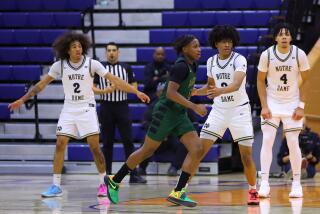Backfield didn’t work out for White, but baccalaureate did
- Share via
FROM SAN FRANCISCO — Many pegged Russell White for a dummy.
They assumed that, academically, the great running back from Encino Crespi High wouldn’t cut it at California.
Even White had his doubts when he arrived on the Berkeley campus in 1989 after one of the most celebrated careers in Southland high school football history.
“When I came home for Christmas break my first semester, I didn’t want to go back,” he says. “I thought I might have bit off more than I could chew, but I sat down with my mom and she basically said, ‘You ain’t coming home. That’s not an option.’ ”
So White, unable to play football as a freshman because he was an academic nonqualifier, stuck around for 3 1/2 more years, proving his detractors wrong by earning a degree in social welfare.
White, 38, is putting his education to work these days as a residential coordinator at Huckleberry House, a shelter for runaways in San Francisco’s famous Haight-Ashbury district.
“He’s been a tremendous asset,” program director Katie Reisinger says. “He has a great way of interacting with the kids, a natural ability, and great energy. We’re very fortunate.”
That’s what then-Cal coach Bruce Snyder thought when he landed the nephew of former USC tailback Charles White. In three seasons at Crespi, White set state records for rushing (5,998 yards), touchdowns (94) and scoring (568 points).
“Back then, I said he was the best high school running back to ever play the game,” says Westlake Village Oaks Christian High Coach Bill Redell, White’s coach at Crespi. “Obviously, I haven’t seen every high school running back that ever played, but I personally have never seen anybody better.”
Recruited by hundreds of colleges, White ultimately chose Cal over USC because he didn’t want to play in the shadow of his uncle’s Heisman Trophy-winning legacy. Also, Cal offered him an unconditional scholarship regardless of how he scored on a standardized aptitude test, while USC did not.
He remains Cal’s all-time rushing leader with 3,367 yards. An All-American as a junior, when he helped the Bears to a 10-2 record, he was projected as a first-round NFL draft pick.
Staying in school for his senior year enabled him to graduate but a mediocre season under a new coach, Keith Gilbertson, probably cost him about $1 million. In 1993, the Los Angeles Rams drafted him in the third round after taking Jerome Bettis in the first.
White turned out to be an NFL bust, carrying the ball two times for 10 yards in his only season, but has no regrets.
Though he ran for nearly 9,500 combined yards in his high school, college and NFL careers, he notes proudly that participating in commencement ceremonies and receiving his college degree “was the best five yards I ever walked.”
A good 40 pounds heavier than when he last played, he lives in Hayward with wife Aminah and their three young children.
Since giving up on the NFL in 1996 -- he played one season for the London Monarchs of the World League of American Football and spent time in camps with the Green Bay Packers and San Francisco 49ers -- White has struggled to find a career that suits him.
A frustrating stint as a probation officer led to high school coaching jobs in Palm Springs and Flagstaff, Ariz., but the winter cold in Flagstaff drove him back to the Bay Area.
College coaching was a goal, but now he’s not sure.
“This is what I went to school to do, as far as dealing with kids and difficult sets of circumstances,” he says of his work at Huckleberry House. “I’ve often thought of opening my own nonprofit -- I’m interested in group homes -- so I’m learning firsthand. The options are out there for something other than football.”
Family comes first.
“From when my [7-year-old] daughter was born, football became less and this became more,” he says of his home life across the San Francisco Bay. “It’s so important to be present in your kids’ lives and not be this person that just comes and goes.”
White’s father, Roosevelt, never played a large role in his life, he says. He was closer to his uncle, whose problems with substance abuse during his NFL career left an indelible impression, fueling a resolve to not repeat his uncle’s mistakes.
He considers it “a blessing” that Snyder took a chance on him when other schools backed away.
“I had to challenge myself to prove I wasn’t what other people might have thought I was going to be,” says White, who was diagnosed with a learning disorder after leaving Crespi. “I knew football would come to an end at some point, and I had a role model for what could happen, which was my uncle.
“I definitely saw his career go from the highest of highs to the lowest of lows, and I knew that wasn’t what I wanted.”
At Cal, White met his wife and silenced his doubters.
To his surprise, his football career crested there too. His failure to make it big in the NFL embittered him for a time, White acknowledges, but eventually he put it behind him.
“I was angry and frustrated,” he says, “but then you think of all the people who never got a chance to take a handoff from Brett Favre, or catch a pass from Steve Young, or block Reggie White, or have a conversation with Jerry Rice.
“At the time, you’re just doing it, but later in life you realize, ‘That was pretty special.’ ”
You realize too that a college degree is its own reward.
--
More to Read
Get our high school sports newsletter
Prep Rally is devoted to the SoCal high school sports experience, bringing you scores, stories and a behind-the-scenes look at what makes prep sports so popular.
You may occasionally receive promotional content from the Los Angeles Times.






